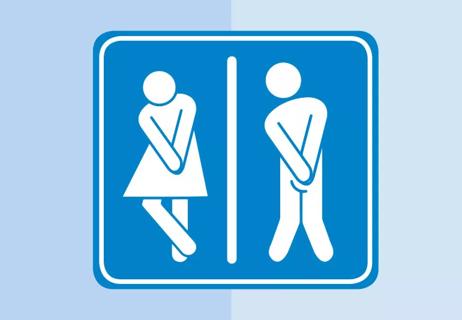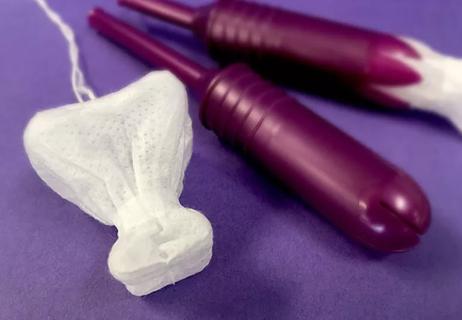Exercises and medical treatments can help you regain control of your bladder

Does a tickle in your nose lead to a dribble down below? Peeing when you sneeze can feel embarrassing, even if no one else notices. And when you first start experiencing this phenomenon, it’s baffling. Why is this happening, and what can you do about it?
Advertisement
Cleveland Clinic is a non-profit academic medical center. Advertising on our site helps support our mission. We do not endorse non-Cleveland Clinic products or services. Policy
Urogynecologist Amy Park, MD, explains this common problem, as well as hacks and treatments that can help.
If you pee when you sneeze, cough, laugh or jump, the most likely cause is stress incontinence. This is a type of urinary incontinence, which means a loss of bladder control.
The “stress” in stress incontinence refers to pressure on your pelvic floor muscles — and although this condition is common, it’s not something you have to live with.
“Your pelvic floor muscles hold your pelvic organs in place,” explains Dr. Park. “When the muscles are too stretched out or weak, they can’t properly support your bladder and urethra.”
But what’s sneezing got to do with it? “Sneezing, coughing, jumping and similar activities cause sudden pressure on your pelvic floor,” Dr. Park explains. “The downward pressure overcomes your pelvic floor muscles, pushing your bladder and urethra downward — and urine comes out.”
Pregnancy, childbirth and hormonal changes during menopause all take a toll on your pelvic floor muscles. Nerve injuries and surgery on your pelvic area can also cause this condition. Stress incontinence affects both sexes, but more frequently occurs in women.
Your bestie’s jokes aren’t as funny when they trigger a trip to the bathroom. Good news: There are at-home solutions that can help put an end to accidents.
Advertisement
“The knack” is a muscle technique you can start doing today. This method involves contracting (squeezing) your pelvic floor muscles just before a sneeze, cough or jump — or even a punchline.
“Normally, your pelvic floor muscles squeeze on their own when they sense pressure,” says Dr. Park. “But when you have stress incontinence, the muscles don’t automatically contract. Using ‘the knack’ can help prevent or reduce leakage from sneezing and other triggers.”
The knack involves three actions done simultaneously. You can do them while sitting or standing:
Not sure you can trust this technique? Try practicing at home with a forced cough or a little jump.
A regular regimen of pelvic floor exercises, commonly called Kegels, could be your solution for stopping leaks. It’s not a quick fix, but they’re simple and effective exercises you can do at home.
“Regular Kegels help you re-learn to lift and hold your pelvic floor,” Dr. Park says.
Don’t worry if you’ve never done a Kegel in your life. You can master how to do pelvic floor exercises in just a few minutes a day. Once you’ve learned the techniques, you can do Kegels in your car, at your desk or whenever it’s convenient, without anyone knowing.
If you find that exercises alone aren’t keeping you dry, you have a few more options.
Like any exercise regimen, doing it at home is helpful — but consulting a pro takes it to the next level. Pelvic floor physical therapy (PT) is like having a personal trainer for your pelvic floor.
During pelvic floor PT, you work with a trained therapist who specializes in pelvic floor disorders. Your therapist teaches you exercises and techniques that give you greater control over your pelvic floor muscles.
“It takes a few weeks to see full results from pelvic floor PT, but it’s well worth the time and effort,” Park says. “For many people, PT is enough to stop leakage. But you need to continue to do the exercises on your own to maintain your strength.”
A vaginal pessary is a silicone, donut-shaped device that you place in your vagina to support your urethra. You can use a pessary alone or in combination with Kegels, depending on your needs.
“Pessaries come in different shapes and sizes, so you need a healthcare provider to help you find the right fit,” Dr. Park explains. “Many people have good results with pessaries, and they’re low-risk and simple to use.”
If Kegel exercises and pessaries aren’t right for you or aren’t doing the trick, your healthcare provider has more options that can help.
Advertisement
“Urethral bulking agents are a nonsurgical way to treat stress incontinence,” says Dr. Park. “Bulking agents are injected into your urethra and act like a filler by plumping up the walls of your urethra. Thicker walls help you stop the flow of urine but still allow you to urinate normally.”
Surgery is another option, and today’s minimally invasive procedures have you home the same day.
“A sling procedure supports your bladder and urethra when your pelvic muscles can’t,” says Dr. Park. “The surgery involves small incisions and a fast recovery. When it’s done by a skilled surgeon, the sling procedure is safe and highly effective.”
Stress incontinence is more than just an inconvenience. Leaks when you sneeze, cough, laugh or exercise can interfere with your quality of life. Many people miss out on activities, like social events or workouts, because they’re concerned about accidents.
You may not want to have to talk about urinary leakage, but remember: Your healthcare provider has heard it all before. It’s what they’re there for!
“Stress incontinence is a medical condition, so don’t be afraid to bring it up,” Dr. Park encourages. “You deserve to enjoy life without worrying about your bladder.”
Advertisement

Sign up for our Health Essentials emails for expert guidance on nutrition, fitness, sleep, skin care and more.
Learn more about our editorial process.
Advertisement

Latchkey incontinence is common, but you can find relief with bladder retraining and other treatments

Before you run out and buy this specialty underwear, there are treatment options to try first, like pelvic floor therapy and medication

Know which drugs can affect bladder control

Exploring an available OTC option

No, but it momentarily slows down during this involuntary body function

As the stalky vegetable breaks down, it leaves behind sulfuric byproducts that can make your pee stink

Most of the time, beeturia is a curiosity, not a concern

If you’re sneezing, you’re definitely awake — you just don’t realize it

Even small moments of time outdoors can help reduce stress, boost mood and restore a sense of calm

A correct prescription helps your eyes see clearly — but as natural changes occur, you may need stronger or different eyeglasses

Both are medical emergencies, but they are very distinct events with different causes